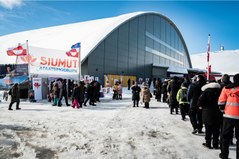- Greenland’s labour market
-
Many lack an education. Many Greenlandic youths do not take further secondary education. One reason is that it could mean moving to another city. More than half of 25 to 64 year-olds (54 %) only have the obligatory 10 year basic education.
A large public sector. Around 40 % of all jobs are found in the public sector. More than 60 % of women in the labour market are employed in the public sector. The jobs of choice among the men are found in fisheries, hunting, agriculture, public administration and the service sector. Most city dwellers are employees, while a large number of people in rural areas are self-employed and hunters.
Few and large sectors. Greenland’s business sector is dominated by large, publicly owned companies and many smaller sole trader companies. Growth is by far largest in the fisheries sector and associated industries and trade. Wholesale and retail, transport and construction are also growth sectors. The growth in tourism is considerably smaller, but is steadily increasing, while the exploration of raw materials is so far not creating growth.
More foreigners. Greenland has some 56,000 inhabitants, including citizens from other Nordic countries. Population numbers have been falling for many years. Foreign nationals from outside of the Nordic region make up 2 % of the population, and their numbers are growing. Most come from the Philippines, Thailand and China.
Few and low-educated unemployed. Unemployment has fallen dramatically over the past five years. In 2014 it was higher than 10 %, but it had fallen to 5 % by 2018. The labour shortage is being dealt with by attracting foreign workers, including unskilled ones. Unemployment is highest among Greenlanders with only a basic education. 84 % of the unemployed only have 10 years of basic education. A relatively high proportion of unemployed Greenlanders also face other challenges beyond unemployment. Half of all job seekers are not considered fit to work.
Support from Denmark. Each year, Greenland receives more than €400 million worth of economic support from Denmark to finance its public sector, which Greenland cannot afford to do on its own.
Nordic model. The Greenlandic labour market runs according to the Nordic model with negotiations between employers’ and employee organisations plus legislation covering areas like work environments and holidays. People without Nordic citizenship must secure permission to stay and to work.
Source: Greenland in Figures 2019, Statistics Greenland and the analysis ”The Greenlandic Economy” from Danmarks Nationalbank, 2018
- Hunting in Greenland
-
Hunting provides an important supplement to the household economy. To hunt, you need a recreational or professional hunting license. Only a few professional hunters can live off hunting alone, and will often supplement their income with dinghy fishing in summer and ice fishing in winter.
Seal still plays an important role. The seal skin is usually traded, while the meat is consumed or used for dog fodder in districts where sled dogs are used. There are a number of whale species: Beluga whale, narwhale, killer whale, harbour porpoise, pilot whale, Atlantic white-sided dolphin, minke whale, bowhead whale, humpback whale, fin whale and walrus. Whaling is regulated by quotas, and the meat and skin is consumed in Greenland only. Reindeer and musk ox are the most important land species.
Source: Greenland in Figures 2019, Statistics Greenland

 Follow us on Facebook
Follow us on Facebook
